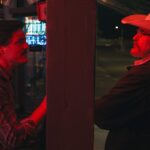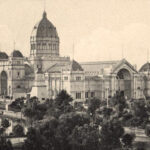Ulysses, Irish author James Joyce’s encyclopaedic novel, vividly immerses us in the birth of the modern, urban, capitalist, industrialised, secular world.[1] Ulysses celebrated its centenary of publication in February of this year and will be further celebrated on June 16th—called ‘Bloomsday’ by fans of the book.[2] While now widely recognised as one of the great novels of the twentieth century, it is not universally beloved.[3] It radically experiments with plot (or lack of plot) and genre; it is sometimes irreverent to the point of blasphemy, sometimes smutty.[4]
While now widely recognised as one of the great novels of the twentieth century, Ulysses is not universally beloved.
Ulysses follows thirty-eight-year-old Leopold Bloom as he goes about his day; as he considers the fact that his wife Molly (Marion), is planning to cheat on him; as he ponders the strain on their marriage ever since the death of their eleven-day-old son.
Early in the day, Bloom crosses paths with twenty-two-year-old Stephen Dedalus—a man haunted by the memory of refusing to comply with his dying mother’s request to pray for her; frustrated with his treacherous friends; and considering to soon leave Ireland.[5]
Bloom follows Stephen and his friends as they head drunkenly towards ‘nighttown’. He rescues Stephen from a fight and invites him home for a cup of cocoa and to stay the night.[6] Stephen declines and Bloom goes to bed. Finally, the novel concludes with a long, punctuation-free interior monologue from Molly.
The title alludes to Homer’s epic The Odyssey, about Odysseus’ beleaguered attempts to return home from the Trojan War.[7] Joyce offers Bloom as a contemporary Odysseus and his ordinary day as this hero’s odyssey.[8] If you are willing to give Ulysses a go, Shakespeare & Company, have released a podcast, Friends of Shakespeare and Company Read Ulysses, which is exactly what it says on the tin.[9]
In this article, I just want to touch on four observations about the novel of interest to Christian readers.
1. Ulysses and Modernity
The novel is the product of modernity and presents us with many of its benefits, challenges, ideas, fears and forces. So many characteristics of modernity are presented to us here: advertising, mass communication and mass media; public transport and infrastructure; the exploration of social ideals such as national independence; universal basic income, republican democracy, capitalism, feminism, vegetarianism, Freudian psychology, sexual liberation, gender fluidity and so on. Ulysses also pushes the boundaries of taboos and conventions regarding patriotism, sexuality and religion, and in doing so, characterises the progressive/transgressive impulse of modernity.[10]
Ulysses, can help us understand modernity at a more experiential and intuitive level.
We are still riding the wave of modernity and as Christians, we are struggling to respond to it. Complementing non-fiction analyses, fictional works such as Ulysses, can help us understand modernity at a more experiential and intuitive level.[11]
2. Ulysses and Modernism
There’s an important difference between modernism and modernity. ‘Modernity’, as a social concept, proclaims knowledge built on solid foundations through scientific methods; it claims objective, universal truth.
By contrast, ‘modernism’ is an artistic concept that shares many characteristics with postmodernity: suspicion of objective, overarching explanations and interest in diversity, fluidity and impermanence.[12] Ulysses is a work of literary modernism, but it could just as well be called a postmodern novel.[13]
Postmodern philosophers, and those who popularise their ideas, often go too far in asserting that there can be no access to objective truth beyond diverse interpretations and political agendas. However, there is large grain of truth here too, and modernist works, like Ulysses, can help us to contemplate it. Considering the limitations of our knowledge is very helpful in biblical interpretation, missionary contextualisation, good listening, constructive negotiation and managing political diversity.
3. Ulysses and Christianity
I read Geoffrey Treloar’s book The Disruption of Evangelicalism, at the same time I began listening to the Shakespeare and Company podcast.[14] Treloar’s book covers the history of evangelicalism in the late Victorian period up until World War I, overlapping with the events covered in Ulysses through to its publication. Treloar helps us appreciate just how challenging it was for evangelicals to figure out how to respond to the enormous disruptions of modernisation, urbanisation and secularisation. Ulysses shows us a three-dimensional picture of people coming to terms with these same changes. They made mistakes, just as we often do in our own day. Nevertheless, we are bound to think and pray about how best to serve Christ, build the church and preach the gospel in the midst of it.
Religion, and religious fluidity, is everywhere in Ulysses:
- Leopold Bloom was born to a Jewish father who immigrated to Ireland, converted to Protestantism and married a Protestant.
- Bloom himself converted to Catholicism in order to marry Molly.
- Two Catholic services feature in the book.
- Bloom is handed a tract for an evangelistic rally featuring an eccentric Scottish-Australian evangelist.
- Bloom taunts an antisemitic publican with the fact that: ‘the Saviour was a Jew and his father was a Jew. … Your God was a Jew. Christ was a Jew like me.’[15]
Evangelicalism features too. The allegorical style of the pre-evangelical Puritan classic The Pilgrim’s Progress is imitated in a funny section of ‘The Oxen of the Sun’. Reuben Torrey (the first round-the-world evangelist)[16] appears in Bloom’s stream of consciousness in the ‘Lestrygonians’ chapter, while Bloom and Stephen discuss inadequacy of Ira Sankey’s gospel songs in ‘Eumaeus’.
Stephen is not simply an atheist materialist. He is haunted by spiritual realities.
The intensity of Stephen’s Jesuit upbringing—first fictionalised by Joyce in A Portrait of the Artist—pervades Ulysses. In the earlier book, Stephen, once converted under extreme, hellfire Jesuit revivalism, experiences a powerful, revelatory deconversion which prevents him praying for his mother on her deathbed. But it seems Stephen is not simply an atheist materialist. He is haunted by spiritual realities, even if he believes them to be far removed from the Catholic religion of his homeland.
Ulysses and Humanity and Meaning
As James Joyce contemplates life at the start of the twentieth century, he has his Bloom and Stephen both think and speak often about the importance of love, understanding, equality—often in contrast to ideologies such as Catholicism and nationalism: ‘I fear those big words … Which make us so unhappy.’[17] Perhaps such idealism makes Ulysses seem outdated in our current context, where we face such polarisation and division between different experiences of ethnicity, religion, class, sexual orientation, and gender. But remembering what we share in common is still vital to combat the extremes of such fragmentation. Christians too want to see deep empathy and kindness that will allow us to understand others and their needs and struggles better—to rejoice with those who rejoice and mourn with those who mourn (Rom. 12:15); to honour, serve and advocate for others appropriately; to disagree with others more generously; and share the gospel with others more persuasively. This Christian empathy is shaped by the way in which God the Son shared in our humanity for our salvation as Hebrews 1–5 celebrates so beautifully.
The fully fleshed-out world that Ulysses seeks to lay bare, is the world in which we worship God.
Ulysses was seen as radical in its time for how down-to-earth it was. It didn’t shy away from describing the full range of bodily functions from digestion to menstruation, from arousal to death. Leopold and Molly’s experiences are especially vivid and holistic: we read of their thoughts, ideals, emotions, desires, shames, fantasies, preferences and discomforts.[18] Christians will not necessarily agree with Joyce about which desires and decisions of the characters in the novel are to be celebrated or accepted. Nor will all Christian want to read about the portrayal of some of these experiences in detail. However, Christians, who believe in a God who took on flesh in his Son for the salvation of the world, will welcome the full recognition of holistic, earthy, physical and spiritual experience. The fully fleshed-out world that Ulysses seeks to lay bare, is the world in which we worship God.
[1] My Penguin Twentieth Century Classics edition has 933 pages: James Joyce, Ulysses, Penguin Twentieth-Century Classics (Harmondsworth: Penguin Books, 1992).
[2] Leopold Bloom is its main character and June 16th 1904 is the day on which Ulysses is set.
[3] Although not as difficult as Joyce’s subsequent and final novel, Finnegans Wake, which contains such lines as “The great fall of the offwall entailed at such short notice the pftjschute of Finnegan, erse solid man, that the humptyhillhead of humself promptly sends an unquiring one well to the west in the quest of his tumptytumtoes: and their upturnpikepointandplace is at the knock out in the park where oranges have been laid to rust upon the green since devlinsfirst loved livvy.” James Joyce, Finnegans Wake (London: Faber, 1939), 3.
[4] In fact it was even banned for obscenity in the United States from 1922 until 1933. The United States District Court lifted that ban in 1933. “’In many places,’ Judge Woolsey wrote, ‘it seems to me to be disgusting,’ but nothing, he added, had been included in it as ‘dirt for dirt sake.’ Before announcing his decision Judge Woolsey noted that he had read the whole book and had given special attention to passages singled out by the government as objectionable. ‘I am quite aware that owing to some of its scenes ‘Ulysses’ is a rather strong draught to ask some sensitive though normal person to take. But my considered opinion, after long reflection, is that whilst in many places the effect of Ulysses of the reader undoubtedly is somewhat emetic, nowhere does it tend to be an aphrodisiac. ‘Ulysses’ may, therefore, be admitted into the United States.’” Quoted in “Court Lifts Ban on ‘Ulysses’ Here” in The New York Times , 7th December 1933, https://archive.nytimes.com/www.nytimes.com/books/00/01/09/specials/joyce-court.html accessed 8th June 2022.
[5] Stephen is the eponymous character of A Portrait of the Artist and a fictionalised portrayal of Joyce himself.
[6] Joyce, Ulysses, 717.
[7] Ulysses is the Latin version of the Greek name Odysseus.
[8] From this point of view, Stephen is Joyce’s Telemachus and Molly his Penelope. In fact, each of the eighteen episodes in the book correspond to the Odyssey: a ‘one-eyed’ Irish nationalist publican is the Cyclops, for example.
[9] Friends of Shakespeare and Company Read Ulysses at https://podcasts.apple.com/ie/podcast/friends-of-shakespeare-and-company-read-ulysses-by/id1605756869 accessed 8th June 2022. Just like it’s easier to pick up the general ‘vibe’ of Shakespeare’s plays when watching them rather than reading them, the same is true for Ulysses. Some of the ‘friends’ including Stephen Fry, Ethan Hawke, Eddie Izzard, Sally Rooney and Jonathan Safran Foer. This podcast also includes a book-club-style discussion every few episodes, that further helps explain and explore the novel.
[10] The impact of the central symbolism, drawing from The Odyssey is also very modern: it affirms the ordinary everyday individual, not merely the Great Man, the saint, the king.
[11] Moreover, fictional works, such as Ulysses, are also ‘primary sources’: artefacts that reveal something of the nature of modernity at a certain point in time.
[12] Summarised helpfully in David William Bebbington, Patterns in History: A Christian Perspective on Historical Thought (Waco: Baylor University Press, 2018), 142–44.
[13] It presents us with shifting perspectives, unreliable narration, subversion of literary conventions; it draws attention to itself as a book and its narrator interrupts the flow of narration; it blurs boundaries between reality, reverie, representation and reader response.
[14] Geoffrey R Treloar, The Disruption of Evangelicalism: The Age of Torrey, Mott, Mcpherson and Hammond (London: Inter-Varsity Press, 2016). The introductory chapter alone is solid gold.
[15] Joyce, Ulysses, 445.
[16] Torrey’s mission tour, together with singer Charles Alexander was kicked-off by an invitation to the 1902 Melbourne Simultaneous Mission.
[17] So says Stephen; Joyce, 38.
[18] In fact, the way in which Molly’s monologue in the final chapter of the novel is so frank about the physical experiences of femaleness, makes it questionable, I think, that Shakespeare and Company chose a trans woman rather than a trans man to read a section of ‘Penelope’!















